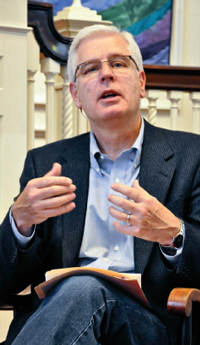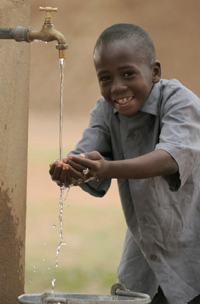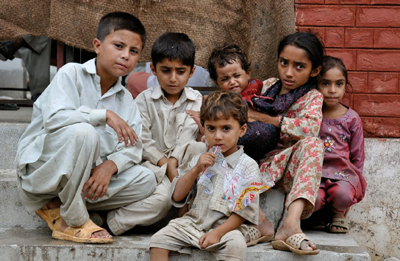CAM: Logistically, what's it like when you visit World Vision's sites?
RS: It varies. Normally I'll stay in a hotel, but there are rural and remote areas where there just aren't hotels. I've stayed in tents; I've slept in what I call "minus-five-star" hotels where there are cockroaches all over, all the windows are jagged glass, and they cost $5 a night but aren't worth the money. We have a lot of staff who travel internationally and they don't stay at the Ritz, but we try to put them up in safe, secure, hygienic places where possible. The work we do is pretty difficult stuff—you're going dawn to dark in 100-degree heat. For Americans especially, it's difficult not to be able to come back to a place where you can clean up and get a good night's sleep, so we try to make that happen wherever we can.
'The Bible is filled, from Genesis to Revelation, with exhortations for social justice and caring for the poor and downtrodden—that ours is a faith not just of the spoken word but of deeds.'
CAM: World Vision has been a major player in the wake of the Haiti earthquake. Could you describe those efforts?
RS: We're doing a variety of things. There are the lifelines of food, water, and sanitation. We're trying to provide sustaining care to more than 1.5 million people in Port-au-Prince—that's World Vision alone. We believe World Vision is the largest aid organization in Haiti; we had more than 800 people before the earthquake, and we now have more than 1,200. We're delivering shelter, tarps, basic hygiene kits, basic toiletry items, cooking pots, clothing—these people have lost everything. And then longer term, how do you rebuild that massive amount of infrastructure? Obviously charities can't do it all—we don't do bridges and ports and government buildings, but we might be able to do single-family dwellings, schools, and community centers. The concern right now is for the long term. What's going to happen down there, and how will the international community respond? You've heard the phrase "a new Marshall Plan" for Haiti, and that's what we have to see emerge.
CAM: Is that earthquake the biggest natural disaster the organization has faced?
 RS: I would say in the last twenty-five years the two biggest crises we've responded to were that and the tsunami in Asia in 2004. Both had about the same loss of life, but there were some real differences. In the tsunami, the death and destruction were spread over thousands of miles of coastline, across five countries, but it affected only about half a mile inland. In Haiti it all happened in a few square miles in Port-au-Prince. And in Haiti, the very institutions that would have been the first responders were also victims. The United Nations lost more than 100 people, and the Haitian government lost dozens of employees and of course all the buildings. NGOs like World Vision, CARE, and Catholic Relief were victims as well. Many of our staff lost houses, and other organizations had deaths among their staff. So the initial two weeks of response were chaotic, because we needed help for our own people.
RS: I would say in the last twenty-five years the two biggest crises we've responded to were that and the tsunami in Asia in 2004. Both had about the same loss of life, but there were some real differences. In the tsunami, the death and destruction were spread over thousands of miles of coastline, across five countries, but it affected only about half a mile inland. In Haiti it all happened in a few square miles in Port-au-Prince. And in Haiti, the very institutions that would have been the first responders were also victims. The United Nations lost more than 100 people, and the Haitian government lost dozens of employees and of course all the buildings. NGOs like World Vision, CARE, and Catholic Relief were victims as well. Many of our staff lost houses, and other organizations had deaths among their staff. So the initial two weeks of response were chaotic, because we needed help for our own people.
CAM: How has the economic downturn hurt donations? Are people still giving, even though they may have less money?
RS: The worst year of the recession, 2009, was our second-best out of sixty years in operation—about $500 million in cash was given to World Vision. People that sponsor children hung in with us. They might have cancelled their cable TV service, but they didn't cancel their child sponsorship. Ironically, the giving from our wealthy donors—people who give us $5,000 and up, some of them more than $1 million a year—fell by 25 to 30 percent over the prior year. There are a lot of reasons for that—there's probably a sermon in how the poor increased their giving and the rich decreased it. I know that some of our larger donors lost their businesses. But many of them gave to us anyway, so it was pretty remarkable. We fared better than most nonprofits, and when we add our government grants and corporate gifts in-kind, we actually posted a 10 percent gain in 2009.

CAM: The central thesis of your book is that Christians have lost touch with the true meaning of the gospel—that they have become known for the things they're against, not what they're for. Could you explain that?
RS: Culture always permeates religion. In Haiti, things like voodoo and superstition permeate Christianity; in America it's materialism and prosperity. So the American version of the gospel that I'm railing against in my book is what I call "a gospel with a hole in it"—that somehow we think that the gospel is just about believing and saying the right things, but it doesn't mean we have to do the right things. Many evangelicals have a version of Christianity that's about preaching the gospel but not actually demonstrating what it means to be a follower of Christ in our lives and with our compassion. Another way of saying it is we often talk the talk without walking the walk. And of course the Bible is filled, from Genesis to Revelation, with exhortations for social justice and caring for the poor and downtrodden—that ours is a faith not just of the spoken word but of deeds, where we are called to care for the poor, the broken, the sick, the widow, the orphan, the alien, the stranger. And unless you have all three of those things—proclamation, justice, and compassion—my thesis is that you're not really following the teachings of our faith and tradition. I'm arguing for people to put their money where their mouth is and to put their faith into action.
'I so love what I do and why I do it; I'm a man at much greater peace with myself than when I was climbing the corporate ladder.'
CAM: How has that message been received by the Christian community?
RS: Surprisingly, very well. After I finished the manuscript I had a panic attack. I said, "I'm the president of World Vision, we have more than two million donors in the U.S., most of them are churchgoers and Christians, and I've just written a book that will alienate all of them." I sent the manuscript to our board chair, one of our directors who's the president of a seminary, and one of our vice presidents who's an ordained minister. And all three came back and said, "This was hard to read, because it was critical, but it was done in a positive spirit. This is a message the church needs to hear, so go for it." Pastors have turned out to be my biggest fans. The book has kind of had a cult following, where pastors are buying hundreds or thousands of copies for their congregations. I'm very gratified, because it means that the message is getting through.
CAM: In the book you talk about your romance with your wife—how she played a key role in leading you to your faith and has served as a moral touchstone.
RS: On our first date at Cornell—we went to a movie in Uris Hall and then to the Anabel Taylor coffeehouse—I asked, "What do you want to do when you grow up?" and she said, "I want to become an attorney and help the poor." I laughed and said, "Well, I want to be a CEO and make a lot of money." And she said, "That's kind of pathetic." Renée did become a lawyer and helped the poor in the Boston area. And look who's helping the poor now, thirty-five years later. I don't think I've won one argument in my marriage, and certainly not this one, but she's been a great inspiration to me. I don't think I could've done any of this without her influence.

CAM: How well did your business experience prepare you for this job?
RS: Certainly it's a different sector; I can't imagine two things farther apart than fine china and global poverty. And yet World Vision has a marketing department, a sales force, an IT department, a finance organization, a human resources organization. We now have 1,200 staff in the U.S. and more than 40,000 worldwide, so there's the challenge of managing an institution, decision-making, problem-solving—all of those things carry over. It's almost like how a pilot can get in any plane and the controls look familiar.
CAM: Are there things you miss about the corporate life?
RS: Probably the thing I miss most is sitting in first class. I travel so much and we fly coach; that's just our policy. And when you fly coach to Johannesburg, South Africa, and you're my age— and I'm six-foot-two—it's like torture. But actually there's very little I miss. I so love what I do and why I do it; I'm a man at much greater peace with myself than when I was climbing the corporate ladder. I once asked my wife, "Why didn't I do this sooner?" And she basically said, "You weren't ready and God wasn't ready to use you until you were grown up enough to see what you now understand."
CAM: How shocked are your college friends to see where you've ended up?
RS: The only people more surprised than I am are my fraternity brothers. When students wonder what they'll do when they graduate, I tell them that my career should be an encouragement to them. I got a degree in neurobiology, then an MBA in marketing. I sold shaving cream at Gillette, I was president of a toy company, then I was president of a tableware company, and now I'm running World Vision doing global relief and development. So if you don't know what you're going to do when you grow up, don't worry about it—it'll work out.


